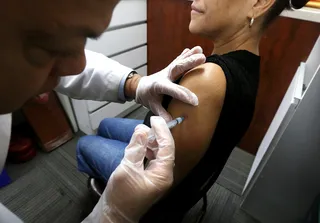The 411 on Vaccines
August kicks off National Immunization Awareness Month.

1 / 12
August Is National Immunization Awareness Month - August kicks off National Immunization Awareness Month. And while many believe that vaccines are just for kids, that couldn’t be further from the truth. Read more about immunization myths, rates among African-American and which shots young people need to get now. — Kellee Terrell(Photo: Kevork Djansezian/Getty Images)

2 / 12
What Are Vaccines and Immunizations? - Vaccines cause immunization — the process of warding off and protecting you from a range of infectious diseases that can harm you and make you sick. You can be vaccinated for a range of infections and viruses including the flu, HPV, whooping cough, polio and measles. Vaccines can be taken orally, injected and inhaled. (Photo: Joe Raedle/Getty Images)

3 / 12
Vaccines Are Safe and Effective - Despite certain celebrities speaking out against vaccines, i.e “vaccinations cause autism,” it’s important to know that ALL vaccines are scientifically proven to be safe and effective. Vaccines prevent millions of deaths per year and curb potential outbreaks in communities across the world. (Photo: REUTERS/Frank Polich)

4 / 12
Who Should Be Vaccinated? - When we think of vaccinations, we often only think about babies and toddlers, but that shouldn’t be the case. The Centers for Disease Control and Prevention suggests that everyone needs to be vaccinated: Teens, younger adults, pregnant women, adults, seniors and health care workers. (Photo: Joe Raedle/Getty Images)

5 / 12
African-Americans and Vaccines - The good news: Black babies and toddlers had similar vaccination rates as their white counterparts for diseases such as measles, mumps and rubella. The bad news: Black adults over 20 are less likely to get a flu shot; young Black women are less likely to receive the HPV vaccination; and Black seniors are 30 percent less likely to receive flu and pneumonia shots, says the Office on Minority Health.(Photo: REUTERS/Jonathan Ernst /Landov)
ADVERTISEMENT

6 / 12
HPV Vaccine - African-American women are 40 percent more likely to develop cervical cancer caused by the STD human papillomavirus (HPV). One way to reduce those chances is with Gardasil, a three-dose HPV vaccine. Gardasil protects women (and boys) against the four strains of HPV. These shots are currently recommended for young girls and women between 11 and 26. (Photo: Joe Raedle/Getty Images)

7 / 12
Meningococcal Vaccine - While meningitis — a viral infection that leads to the inflammation of the membranes (meninges) surrounding your brain and spinal cord — is not very common, it’s spread easily through saliva (kissing) and can be deadly. The CDC recommends that the meningococcal conjugate vaccine (MCV4) should be given when someone is a preteen and then a booster shot to older teens for extra protection. (Photo: Kevork Djansezian/Getty Images)

8 / 12
Flu Vaccine - The flu is not a game — it’s a contagious respiratory illness caused by viruses that can lead to serious health issues and sometimes even death. It's estimated that between five and 20 percent of the U.S. population contracts influenza, and more than 200,000 people are hospitalized from complications of it. Try to get the shot come October/November of each year. (Photo: REUTERS/Jessica Rinaldi)

9 / 12
Hepatitis A and B - While Hep C — a potentially fatal liver infection — may not have a vaccine, but thankfully Hep A and B do. And while there are particular groups more susceptible to these infections — men who have sex with men, anyone with a treated STD, IV drug users and people with tattoos — people outside of these risk groups can still benefit from getting these series of shots. Talk to your doc about these types of vaccines. (Photo: Mario Tama/Getty Images)
Photo By Photo: Mario Tama/Getty Images/ Mario Tama/Getty Images

10 / 12
TDAP Vaccine - This vaccine provides protection for three illnesses — tetanus, diphtheria, and whooping cough. This combined vaccine is recommended for all young people ages 11-18 and may be required for anyone going to college and graduate school. This vaccine is also suggested for women after giving birth and for anyone who is around babies — childcare workers, grandparents, siblings, etc. (Photo: Michael Williamson/The Washington Post/Getty Images)
ADVERTISEMENT

11 / 12
Diseases With No Available Vaccines - Yes, we are lucky to have vaccines for a lot of illnesses, but we don’t have protection from all diseases. Some include malaria, HIV/AIDS and Hepatitis C, to name a few. For a list of all vaccine-preventable diseases go to cdc.gov. (Photo: REUTERS/Jim Young)
